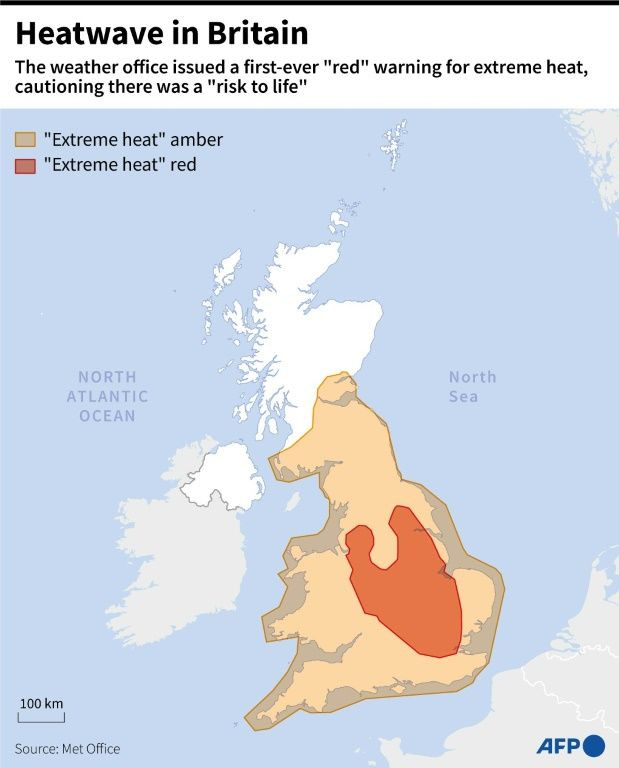Britain Records Highest Ever Temperature Of 40C As Heatwave Intensifies

Britain recorded its highest ever temperature of 40C (104F) on Tuesday as a heatwave gripping Europe intensified, scorching fields and damaging airport runways and train tracks.
The Met Office said the provisional record, which still needs to be confirmed, was recorded at 12.50 pm (1150 GMT) at London's Heathrow Airport, surpassing the previous record of 38.7C recorded in 2019.
Train routes were cancelled, normally busy city centres appeared quiet and zoos struggled to keep their animals cool.
"For the first time ever, 40 Celsius has provisionally been exceeded in the UK," the Met Office said. "Temperatures are still climbing in many places, so remember to stay weather aware."
The forecaster will need to validate the equipment used to record any record temperature before it becomes official.
Britain, which can struggle to maintain key transport services in extreme heat or the snow, has been put on a state of "national emergency" over the unprecedented temperatures.
Transport minister Grant Shapps said it would be many years before Britain could fully upgrade its infrastructure to cope with higher temperatures, after at least two runways showed signs of damage and some train tracks buckled.
"We've seen a considerable amount of travel disruption," he told the BBC. "Infrastructure, much of which was built from the Victorian times, just wasn't built to withstand this type of temperature."
'KEEP HYDRATED'
Commuter Jay Mistry said he had gone into his office to benefit from the air conditioning and planned to work late.
"You've just got to be sensible, just keep hydrated, just avoid the alcohol," he said.
The arrival of a searing heatwave that first sparked wildfires across Europe before arriving in Britain has turned the spotlight on to "net zero" pledges made by the candidates running to replace Boris Johnson as prime minister.
After Johnson championed the move to net zero status when Britain held the United Nations COP26 summit in 2021, some of the candidates to replace him have appeared more lukewarm and rated other challenges facing the country as their priority.
One candidate, Kemi Badenoch, said she believed in cutting carbon emissions but not in bankrupting the economy to do so.
Ed Miliband, a former leader of the opposition Labour Party who leads its response on climate change, said he found the political debate deeply worrying.
"You've got candidates who seem to be falling over each other, not to run towards net zero commitments, but to run away from them," he told BBC Radio.
In central London key attractions appeared quieter than normal, with only a few people stopping to dip their hands in the fountains at Trafalgar Square.
Reinier van den Heurel, who lives in Bucharest, said he was choosing his route through the capital based on the sun. "You walk from shadow to shadow. Anywhere that you have to stay in the sun for a long time, that's off-limits," he told Reuters.
© Copyright Thomson Reuters {{Year}}. All rights reserved.





















